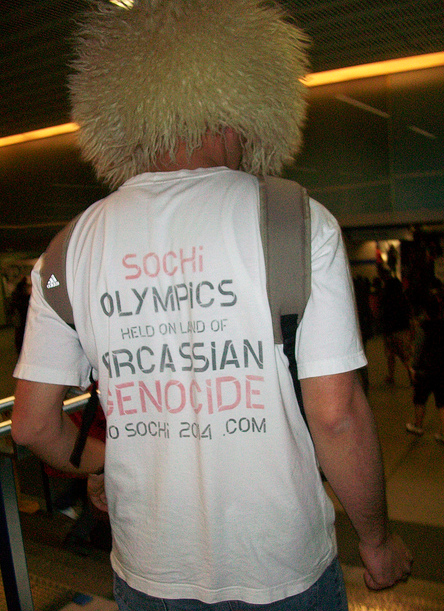
Sochi Olympic Games cold comfort to minorities
Darya Alekseeva, MRG’s Russian Federation Programme Coordinator, argues that the government should be investing more of its time and financial resources on long-term programmes to address the challenges faced by the country’s minorities, rather than splashing out huge sums of money on one-off prestige events.
7 February 2014, the day when the Winter Olympic Games started in Sochi, was a day long awaited in the Russian Federation and beyond. However, this day had been clouded long before by a torrent of statements from the international community and local civil society groups, about the country’s human rights record.

As a Minority Rights Group Europe staff member I would like to seize this opportunity and pose some long-repeated questions: what measures are the government planning to undertake in order to address the marginalization minorities and indigenous peoples are facing in the Russian Federation? What does the state plan to do to safeguard the right to political participation for instance, or the right to receive education in one’s mother tongue? Can the Sochi Olympics change the fact that numerous minority issues remain unresolved?
The Sochi Games have already won the accolade of being the most expensive Olympics in history, with a cost of 50 billion USD. In comparison the budget allocated to the 2014-2020 Programme of Ethno Cultural Development is just 6766.35 million RUR (approximately 19, 324 USD).
The Olympic Games are undoubtedly a very important event, and can be a good investment. However, given the situation for the country’s minorities, is it not more pragmatic to spend less for a one-off event and more for addressing deep-rooted social issues? Ethnic tensions or discriminatory attitudes towards sexual minorities, if left to fester, will be really difficult to resolve solely by way of a change in the law. One just needs to recall events in the Moscow district of Birulevo last year in order to come to the painful conclusion that minority problems in Russia are far from being resolved.
Spending tons of money on the Olympic Games is not in itself a dreadful sin. Many host countries in the past have done the same. But in the case of the Russian Federation, the need to spend money on far more obvious things, including effective mechanisms for minority integration, could support an image of a democratic Government taking care of its citizens, in a way that would make not only Russians themselves, but also the international community, realize that the Government is not spouting hot air, but is actually doing something to address the problems.

Groups representing sexual and ethnic minorities have been protesting the treatment of their vulnerable communities. They have been vociferous long before Sochi, and no doubt will continue their struggles long after the games have finished. The disturbing thing, however, is that the Russian Federation, proclaiming itself a democratic society which abides by the rule of law and the principles of equality and sovereignty, is continuously slipping in the opposite direction, and seems to openly disregard the public outcry about human rights violations and the curtailing of basic freedoms.
The Russian Government would be well-advised to reconsider its policy towards civil society, and especially towards the country’s most vulnerable groups. A genuinely democratic state should spend its money on programmes and services that benefit all, providing everyone with an adequate standard of living, and access to all of the basic rights and freedoms, without unreasonable limitations and restrictions.
—
This article reflects the opinion of its author only and does not engage MRG’s responsibility.